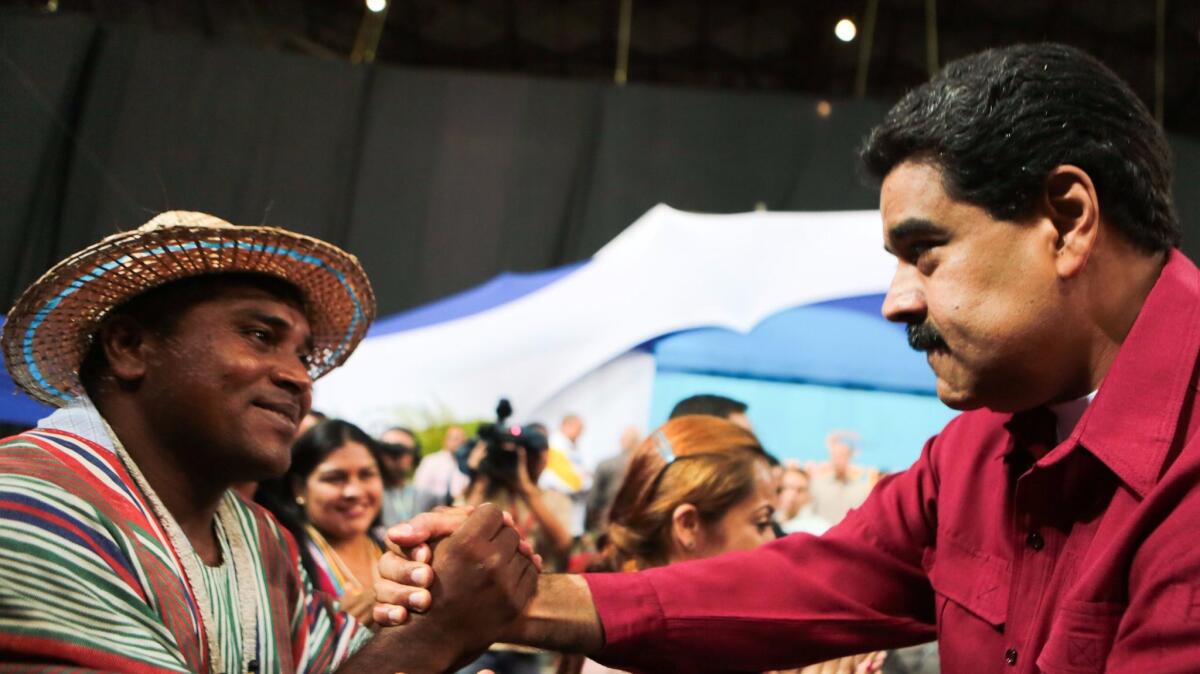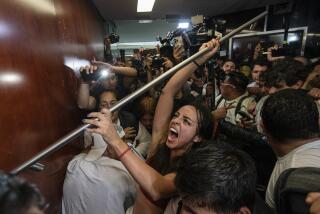Venezuela’s controversial new assembly is set to begin rewriting the constitution

- Share via
Reporting from CARACAS, Venezuela — Members of Venezuela’s controversial new constitutional assembly were sworn in Friday amid criticism from opposition leaders and others who said the rewriting of the nation’s charter should be postponed or canceled.
The 545 members of the assembly were expected to convene Saturday to begin writing a new constitution despite objections by constitutional experts and the nation’s attorney general who consider the creation of a new charter pushed by President Nicolas Maduro illegal because it was not authorized by a majority of Venezuelans in a referendum.
The assembly Friday chose former Foreign Minister Delcy Rodriguez as its president.
Rodriguez, in an address to delegates in the historic Salon Eliptico in central Caracas’ Federal Legislative Palace government complex, said the assembly would improve upon the Bolivarian revolution begun under late President Hugo Chavez and the 1999 constitution that he ushered in.
In the hall were assembly representatives including pro-Maduro candidates representing groups such as people with disabilities, students, the elderly and others she said had been ignored by the opposition-controlled National Assembly. Many held placards with portraits of Chavez and 19th century independence leader Simon Bolivar.
“We come not to destroy our constitution,” Rodriguez said. “We come to defend, deepen and renew it.”
Critics say Maduro wanted new constitutional assembly to illegitimately circumvent the National Assembly democratically elected in late 2015. Although specific plans of the new body have not been spelled out, critics fear it will sideline or cancel the existing congress while handing additional powers to Maduro.
Rodriguez warned the opposition in her speech that “dispensing justice” to opposition leaders whom she blamed for sowing violence and chaos would be a first order of business of the new assembly. Maduro previously had threatened to use new powers to put members of the opposition, news media and congress in jail.
Thousands of Maduro loyalists gathered in the plaza by the government complex. A portrait of Chavez that had been taken down when the opposition-controlled congress took power in early 2016 was brought to the swearing-in ceremony.
Members of the new assembly had marched to the legislative palace with hundreds of government supporters wearing red shirts. They chanted “Viva Chavez” and anti-imperialist slogans, and sang the national anthem.
Meanwhile, members of the National Assembly said they would remain in power regardless of what was done by the constitutional body.
At least 120 people have been killed in violent clashes between authorities and protesters since late March, when a ruling by the Maduro-controlled Supreme Court in effect neutered the National Assembly and transferred its powers to Maduro. Although the ruling was partially rescinded, protests have continued over food scarcities, rising violence and Maduro’s autocratic governing style.
The uncertain political environment, continued chaos on the streets and fears that Venezuela could face new economic sanctions from the United States have caused the value of the bolivar, the national currency, to lose nearly half its value against the dollar on black market exchanges in the last two weeks.
In her talk Rodriguez blamed the “fascist, imperialistic” National Assembly, for waging “economic war” on Venezuelans. She contended that there is no hunger in Venezuela, despite civil society groups saying that food shortages have reduced many citizens to scrounging for sustenance.
The new assembly’s legitimacy received a blow Wednesday when the British company Smartmatic, which supplied voting machines for last weekend’s election of delegates to the new body, declared that the government had manipulated the results and that the tally was off by “more than 1 million votes.”
Atty. Gen. Luisa Ortega Diaz, a Maduro critic, said she would file a lawsuit to stop the constitutional assembly from convening. Ortega said she had opened an investigation into alleged voter fraud in connection with the controversial balloting.
National Electoral Council President Tibisay Lucena, who had criticized the Smartmatic chief executive officer for his statements, announced Thursday night that voting would be rerun in two townships in Tachira and Miranda states. She did not, however, order a halt to the installation of the new assembly.
Special correspondents Mogollon and Kraul reported from Caracas and Bogota, Colombia, respectively.
ALSO
Venezuela’s attorney general seeks to halt installation of newly elected national assembly
Courageous or capitulating? Mexicans debate President Peña Nieto’s phone call with Trump
Brazilian president survives impeachment vote as debating lawmakers throw punches
UPDATES:
3:36 p.m.: This article was updated throughout with Times reporting.
11:35 a.m.: This article was updated with the new assembly holding its first session.
This article was originally published at 6:45 a.m.
More to Read
Sign up for Essential California
The most important California stories and recommendations in your inbox every morning.
You may occasionally receive promotional content from the Los Angeles Times.












